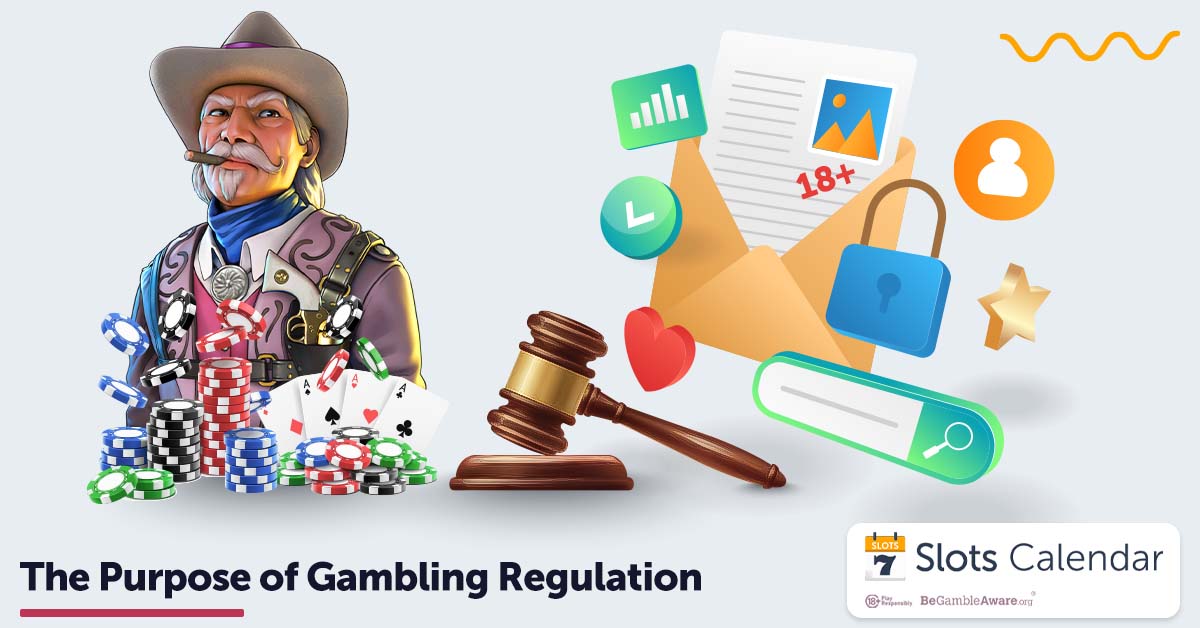It’s no secret that gambling has always been attractive, given its adrenaline-pumping nature, where risk and rewards intertwine in the dance of chance.
Whether we talk about the glittering lights of Las Vegas or about the online casinos accessible at your fingertips, the gambling industry has seen a massive evolution. It basically became a vital part of many societies.
Yet, altogether, with its growth, there’s a pressing need for strict rules and oversight. The rapid expansion has raised questions about its effects on society, economics, and potential drawbacks.
As governments and regulatory institutions handle these issues, the role of regulation in shaping the future of gambling has never been more vital.
Regulation in this industry acts as a vital protector, aiming to balance the fun allure with the competitive market.
On top of that, it also protects consumers by preventing criminal activities and addressing addiction risks.
For this reason, our article will highlight the multifaceted landscape of gambling regulation.
We’ll discuss all the details that will shed light on the regulatory bodies’ activities. So stick around if you want to know how safe gambling works.
Gambling Regulation: Straight to the Basics
Gambling regulation refers to a set of rules, laws, and policies put in place by governments and relevant authorities to oversee and control different aspects of gambling activities within a specific jurisdiction.
The purpose of these rules is to make sure everything remains fair, transparent, and, above all, responsible. Their main aim is to protect both casino operators and players.
Gambling regulation includes several areas, such as:
- Licensing
- Taxation
- Consumer protection
- Prevention of illegal/harmful gambling activities.
Gambling regulation has the responsibility to create a balance between allowing gambling as a legitimate source of entertainment and addressing its potential downsides.
This means that it has to create a safe environment where players all across the globe can enjoy these activities while reducing the chances of problem gambling and fraud.
The Purpose of Gambling Regulation
- Consumer Protection: One of the primary purposes of gambling regulation is to safeguard the interests of consumers.
Regulations aim to ensure that gambling operators offer fair games and transparent odds, protect vulnerable individuals from excessive gambling, and address issues related to problem gambling.
- Preventing Criminal Activities: Gambling can be susceptible to criminal activities such as money laundering, fraud, and organised crime involvement.
Regulation helps to establish strict oversight mechanisms to detect and deter illegal activities within the industry.
- Promoting Fair Competition: Regulations create a level playing field in the gambling industry by setting standards that all operators must adhere to.
This prevents monopolies and encourages healthy competition, which benefits consumers and ensures a diverse range of gambling options.
- Generating Revenue: Many governments generate significant revenue from taxation and licensing fees imposed on gambling operators.
These funds can go to various public services, including healthcare, education, and infrastructure development.
- Social Responsibility: Gambling regulation often includes measures to promote responsible gambling and provide support to individuals who develop gambling-related problems.
These measures include self-exclusion programs, helplines, and educational campaigns.
Different Industry Regulators
As you may know, gambling regulations are different from one country to another. Thus, the responsible authorities may differ accordingly.
Below, we’ll discuss some common types of organisations and authorities that regulate this industry.
- Government Regulatory Agencies: In many countries, government agencies are responsible for overseeing and regulating gambling activities.
National or state governments typically establish these agencies and have the authority to grant licenses, enforce regulations, and collect taxes.
One notable example is the National Office for Gambling (ONJN), a regulatory authority entrusted with the responsibility of establishing and enforcing gambling regulations in Romania.
- Gaming Commissions: Independent gaming commissions or authorities are often established to regulate gambling within specific regions or jurisdictions.
The purpose of these commissions is to ensure fair and transparent gambling practices and may have the power to investigate and penalise non-compliance.
One of the strictest gaming commissions is the UK Gambling Commission, which is responsible for betting activities in the UK.
- Lottery and Gaming Authorities: Some countries have separate authorities for regulating lotteries and other forms of gambling.
These bodies have the task of overseeing the operation of lotteries, scratch cards, and other games of chance.
For instance, the West Virginia Lottery Commission is the official regulator of online casinos.
- Online Gambling Regulators: With the growth of online gambling, many countries have created specific regulatory bodies to oversee internet-based gambling activities.
These regulators focus on issues such as licensing online operators, ensuring the security of online transactions, and preventing underage gambling.
- International Organisations: In some cases, international organisations, such as the United Nations or the European Union, may influence or harmonise gambling regulations across multiple countries, particularly in regions with cross-border gambling activities.
Regulation on Fair Play: The Impact
Regulation within the gambling industry serves as a cornerstone in ensuring the fairness of games. Many achieve this assurance of fairness through several key mechanisms.
First and foremost, regulations often need the use of certified random number generators (RNGs) by gambling operators to determine game outcomes.
This crucial requirement ensures that games are truly based on chance, minimising any potential manipulation or bias.
Moreover, transparency is a fundamental aspect of fairness, and regulations mandate that casinos and online platforms provide accurate information about odds, rules, and payout percentages. This empowers players to make smart decisions.
The Role of Regulation
Regulation isn’t just about rules; it also involves auditing and licensing casinos and online gambling sites.
Regulatory bodies grant licenses to gambling operators after thorough vetting. To obtain a license, operators must demonstrate their commitment to fair play, financial stability, and compliance with all relevant laws and regulations.
Licensing ensures that only reputable and accountable entities are allowed to offer gambling services.
Once licensed, gambling operators are subject to continuous monitoring by regulatory authorities. This includes financial audits, compliance checks, and inspections of their gaming equipment and software to ensure ongoing adherence to fair play standards.
Regulations often require casinos to implement security measures to prevent fraud and cheating. These measures can include surveillance systems, employee background checks, and anti-collusion mechanisms in online poker rooms.
Examples of these regulations include requiring RNGs in electronic games to keep them unpredictable, like in some jurisdictions.
Others, like the state of Nevada in the US, make casinos share the payout percentages of their slot machines. This helps players know their odds of winning.
Regulations also promote responsible gaming with tools like spending limits and self-exclusion options.
Some places, like the Isle of Man and Gibraltar, have third-party audits to check game fairness. And in online poker, regulations in places like New Jersey include rules to stop collusion and cheating.
Regulation Effects on Player Protection
In online gambling, ensuring the well-being and protection of players is of the utmost importance. This responsibility falls heavily on regulatory bodies that oversee the industry.
Regulation serves as a crucial mechanism for safeguarding players’ interests, promoting responsible gambling, and addressing issues such as addiction.
Now, let’s see how regulation serves as a shield for players in various ways.
Ensuring Payouts and Fair Play
One of the fundamental roles of gambling regulation is to ensure that players are treated fairly and receive their winnings promptly.
Casinos and gambling operators have to adhere to strict standards of transparency and fairness in their operations.
This means that games must be genuinely random, payouts must be honoured, and any disputes between players and operators should be resolved impartially.
Moreover, many regulatory bodies require operators to maintain a reserve of funds to cover player payouts, ensuring that even if a casino faces financial difficulties, players’ winnings are still protected.
Setting Age Limits
To protect minors from the potential harm, regulators often impose strict age limits. These age restrictions vary by jurisdiction but generally require players to be at least 18 or 21 years old to engage in legal gambling activities.
Strict age verification procedures are nowadays a must to stop minors from using gambling services.
Promoting Responsible Gambling
Responsible gambling is a cornerstone of effective regulation. Regulators work closely with operators to implement measures that promote safe gambling practices. Some of these measures include:
- Self-Exclusion Lists: Many jurisdictions offer self-exclusion programs, allowing individuals to ban themselves from gambling sites for a predetermined period voluntarily.
This tool empowers players to take control of their gambling habits and seek help when needed.
- Deposit Limits: Regulatory authorities often ask operators to offer deposit limits to players.
These limits allow individuals to set a cap on how much money they can deposit into their gambling accounts within a specific timeframe, preventing excessive spending.
- Reality Checks: Some online gambling platforms provide reality checks, which display the amount of time spent playing and the total amount wagered during a gaming session.
These reminders help players monitor their gambling behaviour and make informed decisions.
- Information and Support: Regulated casinos must provide information about responsible gambling and offer access to support services for individuals struggling with addiction.
This includes helplines, counselling, and resources to help players seek professional assistance.
Dealing with Gambling Addiction
Regulation goes beyond just prevention; it also deals with the important problem of gambling addiction.
Many authorities make it a requirement for operators to identify and help players displaying signs of addiction.
This could mean training casino personnel to identify addictive behaviour or using tools like cooling-off periods, which temporarily limit a player’s access to gambling websites.
What’s even more, some places impose fines or even revoke licenses for operators who don’t follow responsible gambling rules, showing how seriously regulators take this matter.
Regulation Particularities in Fraud Prevention
In the ever-evolving landscape of digital transactions and online gaming, regulation plays a pivotal role in maintaining the integrity of the industry.
The main goals here are to prevent fraudulent activities and protect the sensitive information of players.
In the following, we’ll highlight how regulation plays a crucial role in combating fraud and money laundering in the gaming industry.
Player Data Security and Financial Transactions
Regulation safeguards security and privacy at all online casinos. It enforces strict rules to safeguard player data and financial transactions in online games.
Those who impose regulations make sure gaming platforms use top-notch security measures, such as strong encryption, safe payment methods, and strict authentication processes.
This keeps personal information and financial data safe from cyber threats. Some of the most common regulations that target fraud prevention are:
- Know Your Customer (KYC) Procedures: KYC processes are a vital part of anti-fraud measures. They affirm that gaming operators must thoroughly verify the identity of their players.
This process includes the collection of government-issued identification documents and proof of address.
By implementing KYC procedures, regulators create a strong defence against fraudulent accounts and identity theft.
- Anti-Money Laundering (AML) Regulations: AML procedures aim to stop money laundering in the gaming industry.
Operators must watch for and report suspicious financial activities to authorities.
This helps authorities find and stop money laundering schemes, keeping gaming transactions safe.
- Licensing and Compliance Standards: Many countries and regions require gaming operators to obtain licenses to operate legally.
These licenses often come with strict compliance standards, including regular audits and inspections.
Regulators use these mechanisms to ensure that gaming platforms adhere to fair play rules and maintain high ethical standards.
- Responsible Gaming Regulations: These rules focus on preventing fraud by promoting responsible gaming behaviours.
They require operators to implement tools such as self-exclusion options and spending limits to help players manage their gaming activities and avoid falling victim to fraudulent schemes like addiction-driven overspending.
- Data Protection Rules: To protect player data, regulations such as the European Union’s General Data Protection Regulation (GDPR) and similar laws in other regions require gaming platforms to uphold strict data protection and privacy standards.
This helps prevent unauthorised access to player information, reducing the risk of fraud.
A Glimpse Into The Future of Gambling Regulation
The gambling industry has witnessed a significant transformation in recent years, driven by emerging trends that are reshaping the way people gamble.
Two prominent trends at the forefront of this transformation are online gambling and the use of cryptocurrencies.
While these trends offer exciting opportunities for players and operators alike, they also present unique regulatory challenges.
Online Gambling
The rise of new online gambling sites has allowed players to access a wide range of casino games, sports betting, and other gambling activities from the comfort of their own homes.
This convenience has led to increased participation, but it also raises concerns about responsible gambling, age verification, and the potential for addiction.
Regulators must grapple with how to balance consumer protection with the freedom to gamble online.
Cryptocurrency in Gambling
Cryptocurrencies, such as Bitcoin and Ethereum, have gained popularity in the gambling industry due to their potential for anonymity, fast transactions, and reduced fees. Players can find several Bitcoin casinos, Ethereum betting sites and other crypto-gambling platforms that gravitate around cryptocurrency.
However, their use in gambling raises questions about the transparency of transactions, money laundering, and the potential for fraud.
Regulators are faced with the task of integrating cryptocurrencies into existing gambling regulations or developing entirely new frameworks to address these challenges.
How Regulatory Bodies Are Adapting to These Changes
To address the evolving landscape of gambling, regulatory bodies worldwide are actively adapting their approaches:
- Licensing and Compliance: Regulatory bodies are revising their licensing requirements to accommodate online gambling operators and platforms.
- Technology Integration: Most regulators are exploring the use of advanced technologies like blockchain to enhance transparency and traceability in cryptocurrency gambling.
Many consider smart contracts and decentralised applications (dApps) as tools to ensure fair play and secure transactions.
- International Collaboration: With online gambling crossing borders, regulators are increasingly collaborating with their counterparts in other jurisdictions to establish harmonised standards and share information about operators and players.
The Potential Impact on Players and the Industry
The changing rules in the gambling world have significant effects on players and the industry.
One of the most important things is focusing on keeping players safe. These new rules are meant to make sure bettors benefit from protection.
Players will have access to various tools for responsible gambling, like programs to exclude themselves, limits on how much they can spend, and better ways to confirm their age. All of these measures are meant to prioritise the players’ well-being.
Moreover, these shifts are set to encourage market growth. With online gambling and cryptocurrency becoming more popular, we can expect a more competitive environment with more choices for players.
This heightened competition may translate into improved bonuses, better odds, and overall enhanced gaming experiences.
What’s more, these regulations are pushing the industry to get creative and invest in new ideas.
Gambling companies are actively looking for innovative ways and using advanced technologies to meet these rules and stay ahead in the game.
This means players can look forward to more exciting and safer gambling experiences as the industry works hard to keep up with changing standards and what players expect.
Conclusion
As you can see, regulation is vital for a healthy and ethical gambling industry. It guarantees fairness, player safety, and fraud prevention and adjusts to new trends.
As the gambling world changes, it’s crucial for players and industry stakeholders to keep up with these rules.
When regulation works well alongside the industry, it can flourish and offer a safe and fun experience for everyone.

 Free Slots
Free Slots












